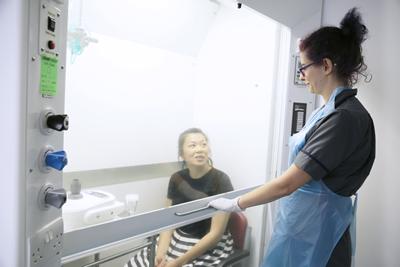Southampton researchers lead landmark £2m study to develop new whooping cough vaccine

Researchers in Southampton are leading the UK arm of a landmark European-wide study to develop a new vaccine to prevent whooping cough.
The condition, also known as pertussis, is a highly-contagious bacterial infection of the lungs and airways caused by a bacterium called Bordetella pertussis (B. pertussis). It is spread through coughs and sneezes of someone with the infection.
It causes repeated coughing that can last for two to three months or more and affects mainly babies under the age of six months – the group most vulnerable to severe and sometimes life-threatening respiratory and neurological complications which require hospital admission.
Adults suffer a milder form of the disease compared to young children but can still have an unpleasant cough for up to three months. The first symptoms are similar to those of a cold and intense coughing bouts start around a week later.
Although antibiotics may not reduce symptoms, they are prescribed to stop the infection spreading to others.
The condition affects around 16 million people every year worldwide, particularly in developing countries, and causes around 200,000 preventable deaths in children.
Although a vaccine is offered to all babies in the UK – where 18 have died as a result of the infection since 2012 – it does not offer lifelong protection and is much less effective than it was 15 years ago.
Now, researchers led by Robert Read, Professor of infectious diseases at the University of Southampton and director of the NIHR Southampton Biomedical Research Centre, have launched a £2.3 million study to improve vaccine testing and development.
It forms part of a wider £24 million European project, PERISCOPE, funded by the Bill & Melinda Gates Foundation and the Innovative Medicines Initiative (IMI), involving experts from 22 institutions across 11 countries.
At the NIHR Southampton Clinical Research Facility, clinicians will inoculate healthy volunteers with nose drops containing B. pertussis and monitor their immune responses before giving them an antibiotic to clear the infection.
"This study is part of a landmark European project that aims to develop a better vaccine against whooping cough as we know protection by the current vaccine seems to be much less effective than it was 15 years ago," said Professor Read, who is also an honorary consultant at University Hospital Southampton NHS Foundation Trust.
"To do this we need to know more about the immune response generated against B. pertussis and what kind of immune response protects against whooping cough."
Volunteers inoculated with B. pertussis will be admitted to the research facility, based at Southampton General Hospital, for 17 days, during which time they will have frequent reviews by senior doctors and nurses and regular nasal and blood samples.
In addition, the researchers will sample the air in volunteers' rooms and take samples from surfaces, while they will also be asked to dip their fingertips in a dish of water and cough or talk in a glass cupboard known as a 'cough box'.
The study is open to healthy volunteers aged between 18 and 45 years old, with compensation of up to £3,500 available to cover time, inconvenience and travel.
Anyone interested in taking part can call 023 8120 3853 or email UHS.recruitmentCRF@nhs.net.


